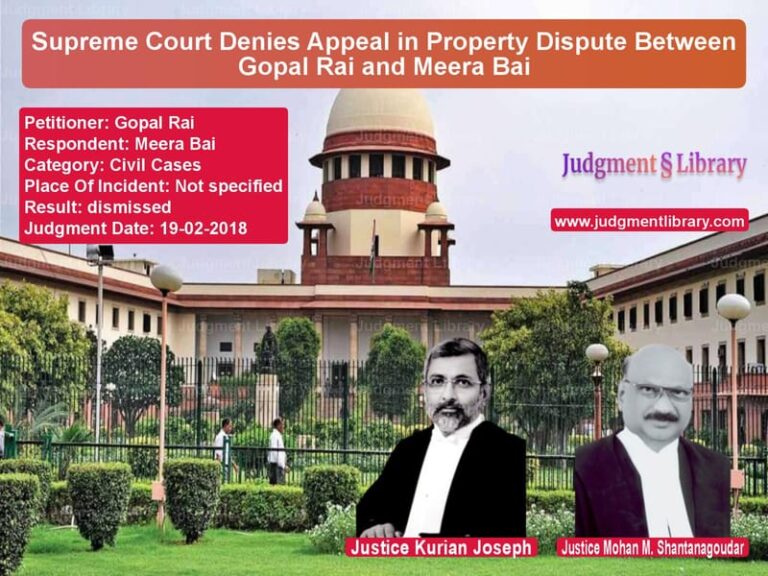Land Possession Dispute: Supreme Court Orders Fresh Hearing in State of Rajasthan vs. Gram Vikas Samiti
The Supreme Court of India recently delivered a significant ruling in the case of State of Rajasthan & Ors. vs. Gram Vikas Samiti, Shivdaspura, where it set aside the Rajasthan High Court’s decision and ordered a fresh hearing. The case revolved around a long-standing dispute regarding land possession and ownership rights. The judgment underscores the importance of procedural correctness, particularly in appellate jurisdiction under Section 100 of the Code of Civil Procedure, 1908.
The Supreme Court found that the High Court had dismissed the State’s appeal without adequately considering whether a substantial question of law was involved. It emphasized the necessity of due legal process, highlighting that any ruling on property rights must be supported by clear reasoning and legal principles.
Background of the Case
The dispute arose when Gram Vikas Samiti, a registered society, filed a civil suit seeking a permanent injunction against the State of Rajasthan and its authorities. The society claimed possession over the disputed land and sought protection against any interference by the government.
Key Developments
- The Trial Court ruled in favor of Gram Vikas Samiti and granted the permanent injunction, restraining the State from interfering in the society’s possession of the land.
- The State of Rajasthan, feeling aggrieved, filed an appeal before the Additional District Judge. However, the First Appellate Court upheld the decision of the Trial Court.
- The State then moved the High Court of Rajasthan in a Second Appeal under Section 100 of the Code of Civil Procedure.
- The High Court dismissed the appeal in limine, stating that no substantial question of law arose.
- The State subsequently appealed to the Supreme Court, challenging the High Court’s summary dismissal.
Supreme Court’s Observations
The Supreme Court, after reviewing the case, found that the High Court had failed to perform its duty in adjudicating a Second Appeal under Section 100 of the CPC. It emphasized the importance of framing substantial questions of law before dismissing an appeal.
The Court observed:
“The High Court did not assign any reasons while dismissing the appeal nor discussed the case on facts or in law. This is clear from the impugned order.”
The Supreme Court further noted that the High Court had merely stated:
“I have heard learned counsel for the appellant-defendants and have also gone through the impugned judgments of the two courts below. I find that the courts below have arrived at the finding after due appreciation of the evidence led by the parties. There is no infirmity in the finding of the courts below. Therefore, there is no substantial question of law involved in this second appeal. Hence, this second appeal is dismissed in limine.”
The Supreme Court found this approach unacceptable, stating:
“Even a cursory reading of the judgments of the Trial Court and the First Appellate Court would show that the second appeal does involve substantial questions of law.”
Legal Principles Applied
Under Section 100 of the Code of Civil Procedure, a Second Appeal can only be entertained if it involves a substantial question of law. The Supreme Court reiterated that:
- A High Court must examine whether a substantial question of law is involved before dismissing a Second Appeal.
- If substantial questions of law exist, the High Court must frame them and provide reasons for its decision.
- Merely stating that no substantial question of law arises, without proper analysis, is an improper exercise of jurisdiction.
Key Arguments
Arguments by the State of Rajasthan (Petitioner)
- The High Court dismissed the appeal without due consideration of legal principles.
- The lower courts’ findings on title and possession were flawed.
- The case involved government land, raising significant legal and public interest issues.
Arguments by Gram Vikas Samiti (Respondent)
- The lower courts had rightly ruled in favor of the society.
- The State had failed to prove its ownership over the land.
- The appeal was rightly dismissed by the High Court as no substantial question of law arose.
Final Judgment
The Supreme Court ruled in favor of the State of Rajasthan and remanded the case back to the High Court for fresh adjudication.
The key directives of the Supreme Court were:
- The High Court must admit the appeal and frame substantial questions of law.
- Proper notice must be issued to the respondent before proceeding with the appeal.
- The High Court must decide the case on its merits, addressing all relevant legal and factual issues.
- The Supreme Court did not express any opinion on the merits of the case, leaving it entirely to the High Court to decide.
Conclusion
The ruling serves as a reminder of the procedural obligations of appellate courts under the CPC. The Supreme Court has reinforced the principle that a High Court must not summarily dismiss a Second Appeal without framing and considering substantial questions of law.
The case will now return to the High Court of Rajasthan, where the legal and factual aspects of land ownership and possession will be revisited. This judgment sets an important precedent for land dispute cases, ensuring that due process is followed in every stage of litigation.
Petitioner Name: State of Rajasthan & Ors..Respondent Name: Gram Vikas Samiti, Shivdaspura.Judgment By: Justice Abhay Manohar Sapre, Justice Indu Malhotra.Place Of Incident: Rajasthan.Judgment Date: 07-01-2019.
Don’t miss out on the full details! Download the complete judgment in PDF format below and gain valuable insights instantly!
Download Judgment: State of Rajasthan & vs Gram Vikas Samiti, S Supreme Court of India Judgment Dated 07-01-2019.pdf
Direct Downlaod Judgment: Direct downlaod this Judgment
See all petitions in Property Disputes
See all petitions in Landlord-Tenant Disputes
See all petitions in Judgment by Abhay Manohar Sapre
See all petitions in Judgment by Indu Malhotra
See all petitions in Remanded
See all petitions in supreme court of India judgments January 2019
See all petitions in 2019 judgments
See all posts in Civil Cases Category
See all allowed petitions in Civil Cases Category
See all Dismissed petitions in Civil Cases Category
See all partially allowed petitions in Civil Cases Category







